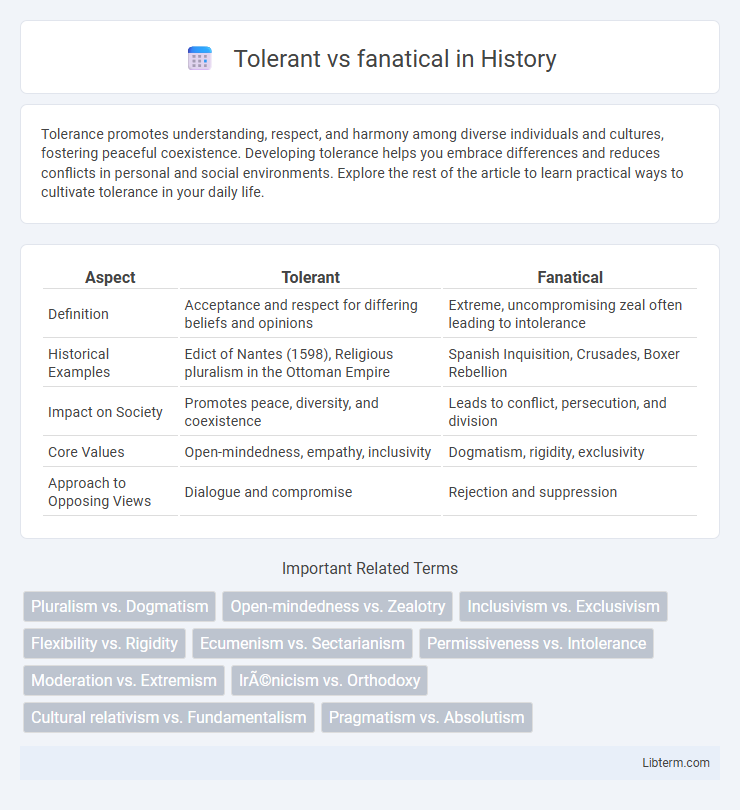Tolerance promotes understanding, respect, and harmony among diverse individuals and cultures, fostering peaceful coexistence. Developing tolerance helps you embrace differences and reduces conflicts in personal and social environments. Explore the rest of the article to learn practical ways to cultivate tolerance in your daily life.
Table of Comparison
| Aspect | Tolerant | Fanatical |
|---|---|---|
| Definition | Acceptance and respect for differing beliefs and opinions | Extreme, uncompromising zeal often leading to intolerance |
| Historical Examples | Edict of Nantes (1598), Religious pluralism in the Ottoman Empire | Spanish Inquisition, Crusades, Boxer Rebellion |
| Impact on Society | Promotes peace, diversity, and coexistence | Leads to conflict, persecution, and division |
| Core Values | Open-mindedness, empathy, inclusivity | Dogmatism, rigidity, exclusivity |
| Approach to Opposing Views | Dialogue and compromise | Rejection and suppression |
Defining Tolerance and Fanaticism
Tolerance is the acceptance and respect for differing opinions, beliefs, and practices without necessarily agreeing with them, promoting peaceful coexistence in diverse societies. Fanaticism involves extreme and uncritical zeal or obsessive enthusiasm, often leading to intolerance, rigid thinking, and sometimes hostile behavior toward opposing views. Understanding the psychological and social dimensions of tolerance and fanaticism highlights their impact on community dynamics and conflict resolution.
Historical Examples of Tolerance and Fanaticism
Historical examples of tolerance include the Mughal Emperor Akbar's policy of Sulh-e-Kul in 16th-century India, promoting religious harmony among Hindus, Muslims, and Christians. In contrast, the Spanish Inquisition exemplifies fanaticism, marked by intense religious persecution and forced conversions during the late 15th to early 19th centuries. The Enlightenment era's emphasis on reason and human rights further solidified tolerance as a crucial value against the backdrop of previous fanatical dogmatism.
Psychological Roots of Tolerant and Fanatical Attitudes
Tolerant attitudes often stem from psychological traits such as empathy, cognitive flexibility, and openness to experience, allowing individuals to embrace diversity and multiple perspectives. Fanatical attitudes, by contrast, are frequently rooted in rigid cognitive schemas, identity protection mechanisms, and heightened existential anxiety, leading to black-and-white thinking and intolerance. Understanding these psychological roots highlights the role of emotional regulation and social identity in shaping tolerant versus fanatical behaviors.
Social Factors Shaping Tolerance and Fanaticism
Social factors such as education level, cultural exposure, and community diversity significantly influence the development of tolerance or fanaticism. High-quality education promotes critical thinking and empathy, reducing susceptibility to fanatical ideologies, while homogeneous or insular communities may reinforce rigid beliefs. Media representation and political discourse also play pivotal roles in shaping individuals' openness or hostility toward differing viewpoints.
Impact on Communities: Harmony vs. Division
Tolerant communities foster social cohesion by embracing diversity and encouraging open dialogue, which reduces conflicts and promotes mutual understanding. Fanatical groups often create division through rigid ideologies, leading to polarization and social unrest. This contrast significantly impacts community stability, with tolerance enhancing harmony and fanaticism driving fragmentation.
Media Influence on Tolerant and Fanatical Perspectives
Media plays a crucial role in shaping tolerant and fanatical perspectives by framing narratives that either promote understanding or reinforce rigid beliefs. Balanced reporting and diverse viewpoints foster tolerance by encouraging critical thinking and empathy among audiences, while sensationalist or biased media can amplify fanaticism through polarizing content and echo chambers. The algorithms powering social media often exacerbate these divides, enabling the rapid spread of extremist ideologies or inclusive discourse based on user engagement patterns.
Tolerance and Fanaticism in Politics and Religion
Tolerance in politics and religion promotes mutual respect and coexistence, encouraging diverse beliefs and peaceful discourse. Fanaticism, in contrast, often results in rigid ideologies that reject opposing views, leading to polarization and conflict. Societies that prioritize tolerance foster inclusive governance and pluralism, while fanaticism risks undermining social stability and democratic principles.
Cultivating Tolerance in a Diverse Society
Cultivating tolerance in a diverse society requires embracing differences and fostering open dialogue to promote mutual respect among varied cultural, religious, and social groups. Tolerance encourages peaceful coexistence by recognizing and valuing diversity, while fanatical attitudes often lead to division and conflict through rigid intolerance and exclusion. Educational initiatives and community programs play a critical role in advancing tolerance by challenging prejudices and supporting inclusive environments.
Warning Signs of Growing Fanaticism
Growing fanaticism often reveals warning signs such as intolerance toward differing opinions, escalating hostility in discussions, and an uncompromising adherence to rigid beliefs. Increased group polarization and the demonization of outsiders indicate a shift from tolerant behavior to fanatical zealotry. Recognizing these patterns early helps prevent social division and promotes healthier dialogue.
Pathways to Promote Tolerance and Counter Fanaticism
Promoting tolerance involves educational programs that emphasize critical thinking, empathy, and cultural awareness to reduce prejudices and encourage peaceful coexistence. Community dialogues and interfaith initiatives foster mutual understanding by facilitating open communication between diverse groups. Countering fanaticism requires early intervention through deradicalization efforts, mental health support, and policies that address socio-economic inequalities contributing to extremist ideologies.
Tolerant Infographic

 libterm.com
libterm.com